 Yahoo has slapped a king-sized gauntlet on the floor as it announced plans to roll out an aggressively-priced online music service.
Yahoo has slapped a king-sized gauntlet on the floor as it announced plans to roll out an aggressively-priced online music service.
The new service, unsurprisingly dubbed Yahoo Music Unlimited, will give downloaders unlimited access to over a million music tracks for US$6.99 (~£3.70 ~€5.42) a month, or, alternatively, for US$60 (~£31.86 ~€36.58) a year.
The service, which also lets users transfer the songs to compatible portable music players, massively undercuts its rival’s services.
RealNetworks, for example, charge a comparatively hefty US$179 (~£95 ~€139) a year for a near-identical service while Napster charging US$14.95 (~£7.95 ~€11.60) a month for a portable music subscription service and US$9.95 (~£5.25 ~€7.72) a month without the portability option.
“We look at subscriptions as a way to get people to pay as little something for digital music as opposed to ripping their own CDs or stealing music.” Yahoo Music General Manager David Goldberg said.
Yahoo hopes that the low, low, low price is designed to get users hip to the subscription music model, which allows consumers to play downloaded music and “streamed” tracks whenever they want — as long as they keep shelling out for the privilege.
Just like Napster’s similar service – which offers a similarly vast online music library – the second a customer’s cash flow stops, their opulent oasis of a record collection will rapidly turns into a tune-free desert.
Yahoo’s price pruning bonanza looks set to spur further expansion of the online music business, which despite huge growth still only accounts for about 2% or less of total music sales, according to analyst estimates.
 Yahoo’s hugely popular Website – visited by 100 million US users every month – should give their music service a big head start, with the company being able to let rip with the kind of massive marketing muscle that few online music rivals can match.
Yahoo’s hugely popular Website – visited by 100 million US users every month – should give their music service a big head start, with the company being able to let rip with the kind of massive marketing muscle that few online music rivals can match.
“It’s a hugely aggressive move, a shot in the arm to the subscription notion,” says David Card, an analyst at Jupiter Research, predicting subscription revenue will be larger than downloads within a few years, from roughly equal shares today.
iTunes, the current online music market leader, provides a different service, preferring to charge users on a song or album download basis, with Apple previously being critical of the subscription model.
Some suspect that they may be pressured into adopting a similar offering once Yahoo’s PR machine rolls into action.
Although it’s generally accepted that subscription services are more lucrative than charging per download, some analysts are wondering whether Yahoo will actually be able to make any dosh at the US$60 (~£31 ~€46) annual subscription level.
Yahoo’s David Goldberg has expressed confidence that the service will be profitable, although conceded that the company could eventually raise its fees. He’s been a bit sketchy with the small-print details too, but says Yahoo will pay music labels royalties linked to its revenue and subscriber numbers for the service.
 Yahoo’s subscription service will work with selected portable MP3 players that use Microsoft’s digital-music format – there’s currently around compatible 10 devices available, including Dell’s DJ player and Creative Technology’s Zen Micro.
Yahoo’s subscription service will work with selected portable MP3 players that use Microsoft’s digital-music format – there’s currently around compatible 10 devices available, including Dell’s DJ player and Creative Technology’s Zen Micro.
Owners of compatible devices will have to install new software on them to be able to use the service, with newer models offering built-in compatibility.
Apple may be slightly perturbed to learn that the Yahoo’s service will not work with their iPod, despite it being the biggest selling digital music player on the planet and probably elsewhere.
Yahoo’s testosterone-charged move reflects their determination to grab a Brobdingnagian chunk of the online music pie, with the company splashing out US$160 million (~£85m ~€124m) last year to acquire MusicMatch, a company already offering a song/album download deal with a non-portable subscription service.
MusicMatch’s subscription charges have now come down to match the new service with Yahoo expected to merge the two services shortly.
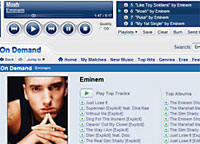 The new service will include free software a la Apple’s iTunes jukebox, with the bonus of letting subscribers rummage around in their friends computers for songs, and then listen to their tracks if the music is part of Yahoo’s catalogue.
The new service will include free software a la Apple’s iTunes jukebox, with the bonus of letting subscribers rummage around in their friends computers for songs, and then listen to their tracks if the music is part of Yahoo’s catalogue.
To further entice subscribers, Yahoo is looking to incorporate the social aspects of listening to and discovering music through tie-ins with other Yahoo services -like gamers on Yahoo’s site being able to listen to the same music as friends they are playing with.
Yahoo Music users not ‘down’ with this subscription thang will still be able to buy tracks under the traditional download model, with fees of 79 cents (~£0.42 ~€0.62) per song for Music Unlimited subscribers and 99 cents (~£0.53 ~€0.77) for nonsubscribers.
Yahoo
MusicMatch
 Apple is elbowing its corporate presence onto Glastonbury Festival with a launch at world famous music event later this week, according to a report in MacWorld.
Apple is elbowing its corporate presence onto Glastonbury Festival with a launch at world famous music event later this week, according to a report in MacWorld.  This will feature winners of a competition run between iTunes and Hit40UK which asked budding musos to create a five-song iMix of tracks they felt appropriate for kick-starting the Dance stage this year.
This will feature winners of a competition run between iTunes and Hit40UK which asked budding musos to create a five-song iMix of tracks they felt appropriate for kick-starting the Dance stage this year.  These take the form of fan-tempting collectible iTunes cards stuffed full of band-specific artwork and special codes that let mustard-keen fans download tracks from a specific artist or album.
These take the form of fan-tempting collectible iTunes cards stuffed full of band-specific artwork and special codes that let mustard-keen fans download tracks from a specific artist or album.  A report by compilers Mintel International has revealed that pets are being ousted by consumer electronics in British homes.
A report by compilers Mintel International has revealed that pets are being ousted by consumer electronics in British homes.  The study observed that, “In those families with children, the demand for pets may not be as strong as it once was, since many children now prefer to immerse themselves in the world of computer games and TV programmes”.
The study observed that, “In those families with children, the demand for pets may not be as strong as it once was, since many children now prefer to immerse themselves in the world of computer games and TV programmes”.  But it’s not all bad news for our precious pampered pooches and treasured tabbies, with the report revealing that sales of pet food, accessories and pet insurance have rocketed by 24 percent in the past five years, reaching a total of US$6.5 billion.
But it’s not all bad news for our precious pampered pooches and treasured tabbies, with the report revealing that sales of pet food, accessories and pet insurance have rocketed by 24 percent in the past five years, reaching a total of US$6.5 billion.  With the rise of home entertainment robots like the Sony Aibo and the forthcoming Nintendo virtual pet game, Nintendogs (where virtual dogs will respond to voice commands and bark at passing Nintendog consoles), we wonder how long it will be before children think that pets live on batteries.
With the rise of home entertainment robots like the Sony Aibo and the forthcoming Nintendo virtual pet game, Nintendogs (where virtual dogs will respond to voice commands and bark at passing Nintendog consoles), we wonder how long it will be before children think that pets live on batteries. 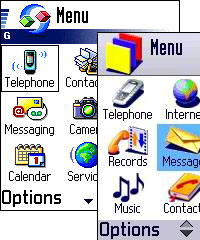 Finnish mobile phone giants Nokia have launched a new Web browser for their Series 60 smartphones.
Finnish mobile phone giants Nokia have launched a new Web browser for their Series 60 smartphones. 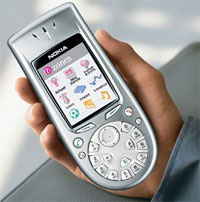 “Nokia is excited to enrich Series 60 with optimised mobile Web browsing. Open source software is an ideal basis for development since it enables Nokia to leverage and contribute to speedy software innovation and development. As a result, the entire Series 60 value chain, from manufacturers and operators to end-users, will benefit from the flexible architecture, full Web compliance and a truly enjoyable user experience,” enthused Pertti Korhonen, Chief Technology Officer, Nokia.
“Nokia is excited to enrich Series 60 with optimised mobile Web browsing. Open source software is an ideal basis for development since it enables Nokia to leverage and contribute to speedy software innovation and development. As a result, the entire Series 60 value chain, from manufacturers and operators to end-users, will benefit from the flexible architecture, full Web compliance and a truly enjoyable user experience,” enthused Pertti Korhonen, Chief Technology Officer, Nokia. 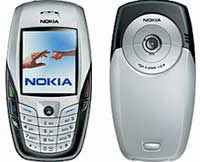 Philip Schiller, Apple’s senior vice president of Worldwide Product Marketing reckons the new browser is the dog’s nadgers: “The Safari Web Kit’s blazing performance, efficient code base and support for open standards make it an ideal open source technology for projects like Nokia’s new Series 60 browser.”
Philip Schiller, Apple’s senior vice president of Worldwide Product Marketing reckons the new browser is the dog’s nadgers: “The Safari Web Kit’s blazing performance, efficient code base and support for open standards make it an ideal open source technology for projects like Nokia’s new Series 60 browser.”  The rumours have been floating around the Internet for weeks, but it now seems certain that Apple will announce later today that it will be switching its computers to Intel’s.
The rumours have been floating around the Internet for weeks, but it now seems certain that Apple will announce later today that it will be switching its computers to Intel’s.  When asked about the deal he said that the company has long pursued a deal with Apple, adding, “We always talk to Apple. Apple is a design win that we’ve coveted for 20 years and we continue to covet them as a design win. We will never give up on Apple.”
When asked about the deal he said that the company has long pursued a deal with Apple, adding, “We always talk to Apple. Apple is a design win that we’ve coveted for 20 years and we continue to covet them as a design win. We will never give up on Apple.” 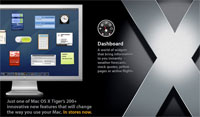 Just 17 days after releasing its ‘Tiger’ OS X 10.4 operating system, Apple has issued a sizeable bug fix update after growing gripes from customers.
Just 17 days after releasing its ‘Tiger’ OS X 10.4 operating system, Apple has issued a sizeable bug fix update after growing gripes from customers.  Russians were also most annoyedski to find the iDVD player bombing when the operating system was set to their home language (something that affected a host of other languages too).
Russians were also most annoyedski to find the iDVD player bombing when the operating system was set to their home language (something that affected a host of other languages too). 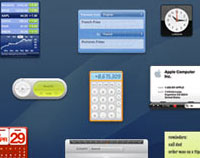 “A lot of things [at Apple] are pretty secretive; there aren’t necessarily as many eyes looking over the products as there could be,” said Wilcox, commenting on the company’s decision to use a limited group of beta testers looking at the code.
“A lot of things [at Apple] are pretty secretive; there aren’t necessarily as many eyes looking over the products as there could be,” said Wilcox, commenting on the company’s decision to use a limited group of beta testers looking at the code.  Microsoft ubermensch Bill Gates foresees mobile phones overtaking MP3s as the top choice among portable music players, while dismissing the popularity of Apple’s iPod player as unsustainable.
Microsoft ubermensch Bill Gates foresees mobile phones overtaking MP3s as the top choice among portable music players, while dismissing the popularity of Apple’s iPod player as unsustainable.  “If you were to ask me which mobile device will take top place for listening to music, I’d bet on the mobile phone for sure,” Gates told the newspaper.
“If you were to ask me which mobile device will take top place for listening to music, I’d bet on the mobile phone for sure,” Gates told the newspaper.  Yahoo has slapped a king-sized gauntlet on the floor as it announced plans to roll out an aggressively-priced online music service.
Yahoo has slapped a king-sized gauntlet on the floor as it announced plans to roll out an aggressively-priced online music service.  Yahoo’s hugely popular Website – visited by 100 million US users every month – should give their music service a big head start, with the company being able to let rip with the kind of massive marketing muscle that few online music rivals can match.
Yahoo’s hugely popular Website – visited by 100 million US users every month – should give their music service a big head start, with the company being able to let rip with the kind of massive marketing muscle that few online music rivals can match.  Yahoo’s subscription service will work with selected portable MP3 players that use Microsoft’s digital-music format – there’s currently around compatible 10 devices available, including Dell’s DJ player and Creative Technology’s Zen Micro.
Yahoo’s subscription service will work with selected portable MP3 players that use Microsoft’s digital-music format – there’s currently around compatible 10 devices available, including Dell’s DJ player and Creative Technology’s Zen Micro.  The new service will include free software a la Apple’s iTunes jukebox, with the bonus of letting subscribers rummage around in their friends computers for songs, and then listen to their tracks if the music is part of Yahoo’s catalogue.
The new service will include free software a la Apple’s iTunes jukebox, with the bonus of letting subscribers rummage around in their friends computers for songs, and then listen to their tracks if the music is part of Yahoo’s catalogue. 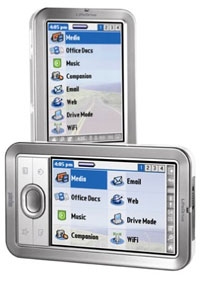 After months of rumours on the Web, details of palmOne’s new LifeDrive PDA have finally shown up on Amazon.
After months of rumours on the Web, details of palmOne’s new LifeDrive PDA have finally shown up on Amazon. 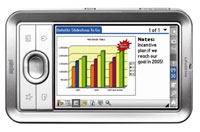 NormSoft’s Pocket Tunes is able to play MP3, WMA, Ogg Vorbis, and WAV files and the unit will also support full screen video and photo playback.
NormSoft’s Pocket Tunes is able to play MP3, WMA, Ogg Vorbis, and WAV files and the unit will also support full screen video and photo playback.  The LifeDrive comes with USB 2.0, so transferring files onto the microdrive should be a fairly nifty business.
The LifeDrive comes with USB 2.0, so transferring files onto the microdrive should be a fairly nifty business.  It’s that time again, a new version of OS X has been released! For those that aren’t aware of OS X, it’s Apple’s operating system. As usual, OS 10.4 is named after a cat: 10.2 was named Jaguar, 10.3 Panther, and the new 10.4 has been titled Tiger.
It’s that time again, a new version of OS X has been released! For those that aren’t aware of OS X, it’s Apple’s operating system. As usual, OS 10.4 is named after a cat: 10.2 was named Jaguar, 10.3 Panther, and the new 10.4 has been titled Tiger.







 Purring like a cat recumbing in cream, Apple CFO Peter Oppenheimer revealed that Apple’s iPod shuffle has snaffled a 58 per cent share of the flash-based digital media market in the US.
Purring like a cat recumbing in cream, Apple CFO Peter Oppenheimer revealed that Apple’s iPod shuffle has snaffled a 58 per cent share of the flash-based digital media market in the US. 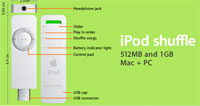 Positively glowing with confidence, Oppenheimer claimed that MP3 capability in handsets will be more complementary than a replacement, with handsets suffering from “a worse user interface and limited battery life,”
Positively glowing with confidence, Oppenheimer claimed that MP3 capability in handsets will be more complementary than a replacement, with handsets suffering from “a worse user interface and limited battery life,”